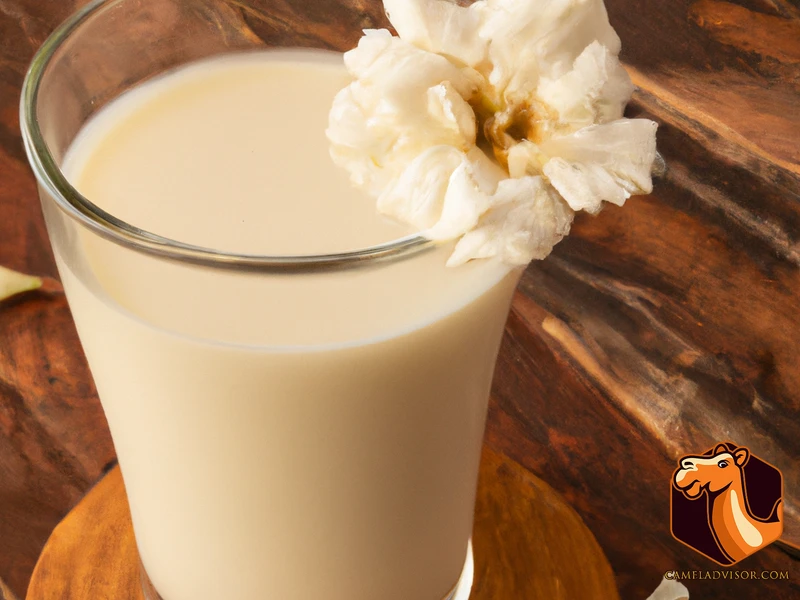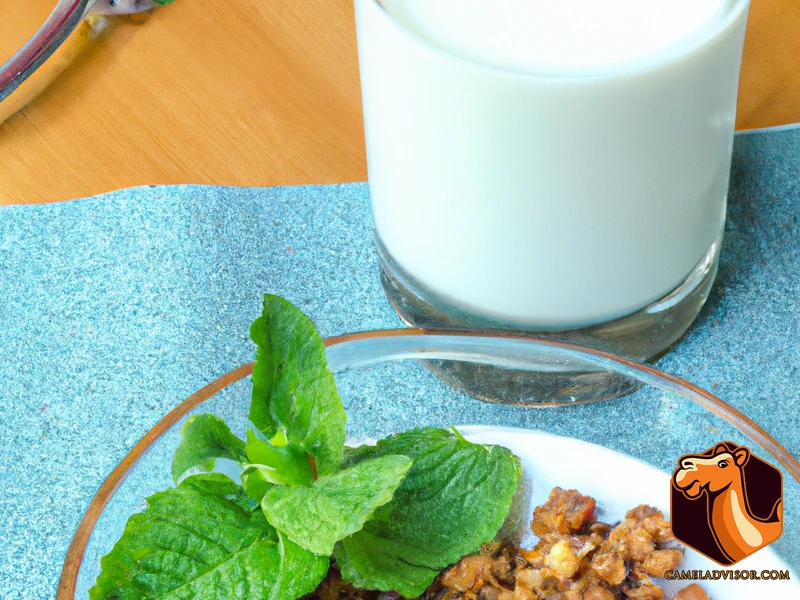It’s not every day that you come across a type of milk that’s not derived from the usual cows, goats, or sheep. But have you ever heard of camel milk? Yes, you read that right! Camel milk has been consumed for centuries in the Middle East, but it is only in recent years that it has begun to gain popularity in other parts of the world. But why would anyone want to drink milk from a camel, you ask? Well, the answer lies in the incredible nutritional value of camel milk and the numerous health benefits it offers. In this article, we will explore the benefits of camel milk and discover why it might just be the next big thing in the world of health and wellness.
Contents
Camel Milk Nutritional Value

Camel milk has been consumed for centuries in various parts of the world, especially in regions where camels are indigenous. It is known to be a rich source of nutrients and has been used for medicinal purposes. The nutritional value of camel milk is quite impressive , containing essential vitamins, minerals, and macronutrients that can be beneficial for overall health. Additionally, camel milk is believed to have certain health benefits that make it a popular alternative to cow’s milk for some individuals. For those interested in comparing the nutritional value of camel milk with cow’s milk, a detailed comparison is available here.
Protein
Camel milk is a great source of protein, providing around 2-3 times more protein per serving than cow’s milk. It contains all the essential amino acids required by the human body, making it a complete protein source. These amino acids are necessary for various functions within the body, including muscle growth and repair, enzyme production, and hormone regulation. Additionally, camel milk is rich in immunoglobulins, which help boost the immune system.
Here are some of the specific types of proteins found in camel milk:
- Caseins: These proteins are the main type found in milk and make up about 80% of camel milk protein. Caseins are slow-digesting and provide a steady release of amino acids to the body over time, making them ideal for muscle and tissue repair.
- Whey proteins: Like cow’s milk, camel milk also contains whey proteins, which are rapidly digested and absorbed by the body. These proteins are the primary source of the immunoglobulins found in camel milk and are also known to have antioxidant and anti-inflammatory properties.
- Camel whey proteins: Researchers have identified unique whey proteins in camel milk that are not found in cow’s milk. These proteins have been shown to have antibacterial and antiviral properties, helping to protect against infections.
Including camel milk in your diet can provide you with a high-quality protein source, especially if you’re looking to build or maintain muscle mass. It could be a useful addition to the diet of athletes, bodybuilders, or anyone who wants to improve their overall health.
If you’re lactose intolerant, camel milk might be a good alternative, as it has a lower lactose content than cow’s milk. To learn more about how camel milk can benefit people with lactose intolerance, you can read our article “Can Camel Milk Help People with Lactose Intolerance?”.
It’s essential to know that the processing methods for camel milk can affect its nutritional composition. To understand the impact of processing on camel milk nutrition, read our article, “The Impact of Camel Milk Processing on its Nutrition.”
Camel milk is a nutritious beverage that can be enjoyed as part of a balanced diet. To know more about how camel milk can be integrated as part of a balanced diet, check out our article “Is Camel Milk a Good Addition to a Balanced Diet?”.
Fat
Camel milk is considered to have a lower fat content than cow milk, making it a great alternative for those concerned about their fat intake. However, the type of fat found in camel milk is unique and has a number of health benefits.
Saturated Fat: Camel milk contains a lower amount of saturated fat than cow milk. Saturated fat has been linked to an increased risk of heart disease when consumed in excess.
Monounsaturated Fat: Camel milk is a good source of monounsaturated fatty acids, which are known to have health benefits including reducing inflammation and improving insulin sensitivity.
Polyunsaturated Fat: Camel milk is a good source of polyunsaturated fatty acids which are important for maintaining healthy cells and promoting brain function.
To highlight the nutritional value of camel milk’s fat content, here’s a comparison table of the fat content of 100ml camel milk and 100ml cow milk:
| Camel milk (100ml) | Cow milk (100ml) | |
|---|---|---|
| Saturated fat | 1.1g | 1.9g |
| Monounsaturated fat | 0.6g | 1.1g |
| Polyunsaturated fat | 0.2g | 0.4g |
The unique fat content of camel milk provides a balance of healthy fats, making it an excellent addition to a healthy diet.
Carbohydrates
Camel milk also contains carbohydrates, which are an essential macronutrient that provides energy to the body. The carbohydrate content of camel milk is relatively low compared to cow’s milk. It contains around 4.8g of carbohydrates per 100ml, which is approximately 30% lower than cow’s milk.
The carbohydrate in camel milk is mainly in the form of lactose, a type of sugar that is naturally found in milk. Lactose intolerance is a common condition where the body cannot digest lactose properly, leading to bloating, gas, and diarrhea. However, some studies suggest that people with lactose intolerance may be able to tolerate camel milk better than cow’s milk due to the differences in lactose structure.
Apart from lactose, camel milk also contains other types of carbohydrates such as oligosaccharides and polysaccharides. These types of carbohydrates are not digested by human enzymes but serve as prebiotics, which are food for the beneficial gut bacteria. The presence of prebiotics in camel milk may help promote gut health and prevent certain gut-related diseases such as colitis and inflammatory bowel disease.
The carbohydrate content of camel milk is relatively low, which may be beneficial for people who are watching their carbohydrate intake. The presence of prebiotics in camel milk may offer additional health benefits for gut health. Below is a table that summarizes the nutritional value of camel milk’s carbohydrates.
| Carbohydrate | Content per 100ml |
|---|---|
| Lactose | 4.8g |
| Oligosaccharides | ~0.1-1g |
| Polysaccharides | ~0.47g |
Vitamins and Minerals
When it comes to nutrition, camel milk packs a punch in terms of vitamins and minerals. Here’s a table that outlines the key vitamins and minerals found in camel milk:
| Vitamin/Mineral | Amount per 100ml | % Daily Value* |
|---|---|---|
| Vitamin C | 3mg | 4% |
| Iron | 0.2mg | 1% |
| Calcium | 120mg | 12% |
| Potassium | 200mg | 6% |
| Vitamin B1 (Thiamin) | 0.03mg | 2% |
| Vitamin B2 (Riboflavin) | 0.07mg | 4% |
| Vitamin B3 (Niacin) | 0.2mg | 1% |
| Vitamin B5 (Pantothenic Acid) | 0.1mg | 1% |
| Vitamin B6 | 0.05mg | 2% |
| Vitamin B9 (Folate) | 1mcg | 0.2% |
| Vitamin B12 | 0.0003mg | 0.03% |
| Zinc | 0.18mg | 1% |
| Copper | 0.05mg | 2% |
As you can see, camel milk is a good source of many essential vitamins and minerals that our bodies need to function properly. Vitamin C, for example, is an important antioxidant that helps protect our cells from damage. Calcium is important for strong bones and teeth, while iron is needed to make hemoglobin, a protein in our red blood cells that helps carry oxygen throughout our bodies.
By including camel milk in your diet, you can help ensure that your body is getting the nutrients it needs to stay healthy and strong.
4 Health Benefits of Camel Milk
Camel milk is an ancient beverage that has been consumed for centuries in many regions of the world. It provides a wide range of health benefits that have only recently been discovered by modern scientific research. In this section, we will explore the numerous advantages of consuming camel milk and how it can help improve your overall well-being. From boosting the immune system to supporting heart health, camel milk has a lot to offer. So, let’s dive in and learn more about the incredible benefits of this nutrient-rich milk.
1. Helps Improve Immune System
Camel milk is known to have immunomodulatory properties that can help improve the immune system. This is due to the presence of certain proteins and antibodies that have a positive impact on the body’s defense mechanism. Here are some of the ways in which camel milk helps boost the immune system:
- Antibacterial Properties: Camel milk contains certain proteins such as lactoferrin and lysozyme that have antibacterial properties. These proteins help prevent the growth of harmful bacteria and make the body more resistant to infections.
- Antiviral Properties: In addition to antibacterial properties, camel milk also has antiviral properties. Some studies have shown that camel milk can inhibit the growth of certain viruses such as the herpes simplex virus and rotavirus.
- Immune-Boosting Nutrients: Camel milk is a rich source of nutrients such as vitamins A, C, and E, as well as zinc and selenium, which are known for their immune-boosting properties.
- Reduced Inflammation: Chronic inflammation can weaken the immune system and make the body more susceptible to diseases. Camel milk contains anti-inflammatory compounds that can help reduce inflammation and improve immune function.
The immunomodulatory properties of camel milk make it a great addition to the diet for improving overall immune function and preventing diseases.
2. Good for People with Lactose Intolerance
Camel milk is a great alternative for people who are lactose intolerant. Lactose intolerance occurs when the body is not able to digest the sugar found in milk which is called lactose. This condition affects millions of people worldwide, causing various digestive issues such as bloating, cramps, and diarrhea.
Fortunately, camel milk is low in lactose content, making it easier for lactose intolerant individuals to consume. Studies have shown that people who are lactose intolerant can consume camel milk without experiencing any negative side effects. The small amount of lactose present in camel milk is easily digestible for most people.
Moreover, camel milk contains A2 beta-casein protein, which is different from the A1 beta-casein protein found in cow’s milk. Many people who are intolerant to cow’s milk are actually sensitive to A1 beta-casein protein. This makes camel milk a great alternative for those who suffer from cow’s milk intolerance.
To add camel milk to your diet, you can use it as a substitute for cow’s milk in your morning cereal, coffee, or smoothies. You can also use it to make cheese, yogurt or any other dairy products.
Camel milk is a great option for people who suffer from lactose intolerance and cow’s milk sensitivity. The low lactose content and different type of protein found in camel milk make it an easy-to-digest and nutritious alternative to cow’s milk.
3. Helps Manage Diabetes
Diabetes is a chronic metabolic disorder that affects millions of people worldwide. It occurs when the body is unable to produce enough insulin or use the insulin it has effectively, leading to high blood sugar levels. Camel milk can be an effective management tool for diabetes due to its unique nutritional composition.
One of the key benefits of camel milk for people with diabetes is its low glycemic index. The glycemic index (GI) is a measure of how quickly foods raise blood sugar levels. Foods with a high GI can cause blood sugar levels to spike quickly, which can be dangerous for people with diabetes. In contrast, camel milk has a low GI, which means it causes a slower and more gradual increase in blood sugar levels. This can help people with diabetes better manage their blood sugar levels and reduce the risk of complications.
Camel milk also contains insulin-like proteins, which can have a positive effect on insulin sensitivity. Insulin sensitivity refers to how well the body responds to insulin. Individuals with diabetes are often insulin resistant, meaning their bodies no longer respond to insulin in the same way. However, studies have shown that camel milk may improve insulin sensitivity and improve glucose uptake in cells.
Camel milk is also high in antioxidants, which can help protect against oxidative stress. Oxidative stress occurs when there is an imbalance between the production of free radicals and the body’s ability to detoxify them. Oxidative stress is thought to play a role in the development of diabetes and its complications. Thus, the antioxidants present in camel milk may help prevent or manage the development of diabetes-related complications.
Here is a table summarizing the key nutritional components of camel milk that make it an excellent choice for people with diabetes:
| Nutrient | Amount per Serving |
|---|---|
| Protein | 4.5g |
| Fat | 2.2g |
| Carbohydrates | 12g |
| Calcium | 15% of daily value |
| Iron | 2% of daily value |
| Vitamin C | 5% of daily value |
Camel milk has tremendous potential in helping to manage diabetes due to its low glycemic index, insulin-like proteins, and high antioxidant content. However, as with any dietary change, it is important to consult with a healthcare professional before incorporating camel milk into your diet, especially if you are on medication for diabetes.
4. Supports Heart Health
Camel milk has a number of benefits for heart health due to its low-fat and low-cholesterol content. Studies have shown that drinking camel milk can help lower blood pressure and reduce the risk of heart disease.
One of the key factors in camel milk that is beneficial for heart health is its high content of healthy fatty acids such as linoleic acid and oleic acid. These fatty acids can help reduce inflammation and improve cholesterol levels, which can ultimately lead to a healthier heart.
Camel milk is high in potassium and low in sodium, which is ideal for maintaining a healthy blood pressure. A 100 ml serving of camel milk contains around 120 mg of potassium, which helps counteract the negative effects of sodium and lower blood pressure.
Camel milk also contains a good amount of vitamin B1 (thiamine) which plays a crucial role in maintaining a healthy heart. Thiamine helps to support the proper functioning of the nervous system and heart muscles, which are essential for maintaining a healthy heart.
Including camel milk in your diet can have a positive impact on heart health. Below is a table outlining the nutritional content of camel milk relevant to heart health:
| Nutrient | Amount per 100 ml serving |
|---|---|
| Linoleic acid | 4.8 g |
| Oleic acid | 1.2 g |
| Potassium | 120 mg |
| Sodium | 50 mg |
| Thiamine (Vitamin B1) | 0.03 mg |
How to Include Camel Milk in Your Diet

Camel milk can be a highly nutritious addition to your diet. However, if you’re not used to drinking it, you may be unsure of how to incorporate it into your daily meals. Here are some tips on how to include camel milk in your diet:
1. Drink it plain: The simplest way to include camel milk in your diet is to drink it plain. You can have a glass of camel milk in the morning or before bedtime. This can be a refreshing and healthy alternative to cow’s milk.
2. Use it in smoothies: Camel milk can be used as a base for smoothies. You can add your favorite fruits and vegetables to make a healthy and delicious smoothie. This will not only add flavor to your diet but also provide the benefits of camel milk and the nutrients of the added fruits and vegetables.
3. Add it to your coffee: If you’re a coffee lover, try adding camel milk to your coffee instead of cow’s milk. Camel milk has a slightly sweet and nutty taste which can complement the flavor of coffee.
4. Use it in baking: Camel milk can be used as a substitution for cow’s milk in baking recipes. You can use it in cakes, muffins, and bread. This will not only make your baking healthier but also add a unique taste.
5. Make milkshakes: Camel milk can be used as a base for milkshakes. You can add your favorite flavorings like chocolate or strawberry, and blend it to make a delicious and healthy treat.
Keep in mind that it’s important to start incorporating camel milk into your diet slowly, especially if you have never had it before. Gradually increase your intake, starting with a small amount and working your way up. This will help your body adjust and avoid any stomach discomfort.
Incorporating camel milk into your diet can be a delicious and healthy alternative to cow’s milk. Experiment with different recipes and find your favorite ways to enjoy the benefits of this nutritious milk.
Where to Buy Camel Milk
If you’re interested in incorporating camel milk into your diet, you may be wondering where to buy it. Fortunately, camel milk has become more widely available in recent years.
One option is to purchase camel milk online. There are several reputable online retailers that sell camel milk and ship it directly to your door. When shopping for camel milk online, be sure to choose a trusted source and read reviews from other customers to ensure you’re getting a high-quality product.
Another option is to check with your local health food store or specialty grocery store. Some stores may carry camel milk, especially those that cater to customers with dietary restrictions or a interest in unconventional foods.
If you live in an area with a large Middle Eastern or North African population, you may be able to find fresh camel milk at a local market or from a local farmer. This can be a great way to find fresh, locally-sourced camel milk.
Before purchasing camel milk, it’s important to note that it can be more expensive than cow’s milk or other dairy alternatives. However, many people find that the health benefits and unique taste make it worth the extra cost.
No matter where you choose to buy camel milk, be sure to store it properly to ensure freshness and quality. Camel milk should be kept refrigerated and consumed within a few days of opening.
Is Camel Milk Safe to Drink?
One important aspect to consider when it comes to camel milk is whether or not it is safe to consume. Like any other food product, it is essential to ensure that the milk is free from harmful substances and bacteria that can cause illness or allergic reactions.
The good news is that various studies have shown that camel milk is generally safe for human consumption. It contains several natural antimicrobial components that allow it to resist spoilage, making it a safer option than other types of milk. Additionally, camels are hardy animals that are known to resist diseases, meaning that the risk of transmitting harmful pathogens to humans is relatively low.
However, it is still important to take precautions when drinking camel milk, especially in countries where it is not typically consumed. To ensure that the milk is safe, it is recommended to purchase it from reputable sources that follow proper hygiene and safety measures. This is particularly relevant when consuming raw or unpasteurized camel milk, which may contain harmful microorganisms.
Another thing to keep in mind is that camel milk has a different protein structure than cow’s milk, and some people may be allergic to it. If you are new to drinking camel milk, it is best to start with a small amount and see how your body reacts.
While camel milk is generally safe to consume, it is crucial to take necessary precautions and purchase it from trustworthy sellers. As with any new food product, it is always a good idea to start slowly and pay attention to how your body responds.
Conclusion
In conclusion, it can be said that camel milk has numerous health benefits and nutritional value, making it a great addition to one’s diet. Its high protein, low fat, and low lactose content make it an ideal alternative to cow’s milk for people with lactose intolerance. Plus, camel milk is rich in essential vitamins and minerals including calcium, iron, and vitamin C.
Studies have shown that regular consumption of camel milk can also help improve the immune system, manage diabetes, and support heart health. These benefits are mainly attributed to the presence of unique bioactive compounds such as immunoglobulins, insulin-like proteins, and antioxidants.
Although camel milk is not yet widely available in many parts of the world, it can be purchased online or through specialized markets. However, it’s essential to ensure that the milk is coming from healthy camels and has undergone proper processing to avoid the risk of contamination.
Overall, incorporating camel milk into your diet can be a great way to diversify your protein sources while reaping its numerous health benefits. So, consider giving camel milk a try and experience the goodness it brings to your health and wellness.
Frequently Asked Questions
Question 1?
Can camel milk be consumed by individuals who are allergic to cow’s milk?
Answer:
Camel milk is considered to be hypoallergenic and can be consumed by individuals who are lactose intolerant or have a cow’s milk allergy.
Question 2?
Is camel milk beneficial for those who suffer from autoimmune diseases?
Answer:
Camel milk contains unique proteins that can help boost the immune system and reduce inflammation in individuals who suffer from autoimmune diseases.
Question 3?
Does camel milk have a strong taste?
Answer:
Camel milk has a slightly sweet and nutty taste and is considered to be less creamy than cow’s milk.
Question 4?
Can camel milk help improve skin health?
Answer:
Camel milk is rich in vitamins and minerals that can help improve skin health and reduce the appearance of wrinkles and fine lines.
Question 5?
Is camel milk lactose-free?
Answer:
Camel milk contains lactose, but the lactose molecules are smaller and more easily digested than lactose in cow’s milk.
Question 6?
Can pregnant women consume camel milk?
Answer:
Yes, pregnant women can consume camel milk as it is considered to be safe and may offer additional health benefits.
Question 7?
Is camel milk more expensive than cow’s milk?
Answer:
Camel milk is generally more expensive than cow’s milk due to the smaller supply and higher production costs.
Question 8?
Can camel milk be used as a replacement for breast milk or infant formula?
Answer:
No, camel milk should not be used as a replacement for breast milk or infant formula as it does not provide all of the necessary nutrients for infants.
Question 9?
Does camel milk have a longer shelf life than cow’s milk?
Answer:
Yes, camel milk has a longer shelf life than cow’s milk and can last up to 7 days when stored properly.
Question 10?
Can camel milk be used in cooking?
Answer:
Yes, camel milk can be used in cooking and baking as a substitute for cow’s milk in many recipes.







